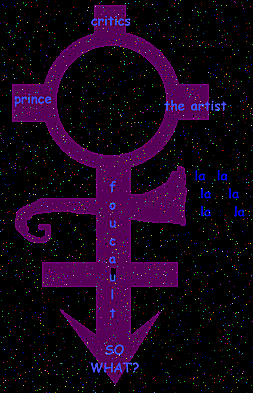

While not arguing that  is any kind of Foucauldian theorist, I
maintain that his critiques of the music industry and his constant focus on the importance
of the text as the object that labels an individual resemble some of Foucault's important
ideas.
For one, he insists on defining himself by his lyrics, not by his personal life. Clearly, he
has attempted to blur his identity both in his interview
techniques and in his own reporting of his past.
is any kind of Foucauldian theorist, I
maintain that his critiques of the music industry and his constant focus on the importance
of the text as the object that labels an individual resemble some of Foucault's important
ideas.
For one, he insists on defining himself by his lyrics, not by his personal life. Clearly, he
has attempted to blur his identity both in his interview
techniques and in his own reporting of his past.
 . For instance, after
an incident in which one of his body guards snatched a camera from a photographer in
the wake of Prince's not joining in with the "We are the World" collaboration (he
contributed with his own song, but did not join the large group of celebrity singers), he
released "Hello" as a musical explanation of the whole situation. In other words, he
wants to keep attention on his lyrics, not on him; but then he brings the two together,
making the distinction difficult to maintain.
. For instance, after
an incident in which one of his body guards snatched a camera from a photographer in
the wake of Prince's not joining in with the "We are the World" collaboration (he
contributed with his own song, but did not join the large group of celebrity singers), he
released "Hello" as a musical explanation of the whole situation. In other words, he
wants to keep attention on his lyrics, not on him; but then he brings the two together,
making the distinction difficult to maintain.
- As far as the incident concerning the photographer goes, it's on the flip side of "Pop Life." The main thing it says is that we're against hungry children, and our record stands tall.
Accounts of Prince's attitudes toward the big business and the controlling interests of that business that had woven themselves into the fabric of his life are part of the forces that moved him toward his change in identity. He claims variously that "Prince" is a business and that "Prince" was a person. The blurred distinction is one of identity and it forces into view the blurring between an "author" and the individual who embodies that author function. As the final claim in the following list suggests, in Prince's struggle to deal with the complexity of embodying an author-function that is so immediately accessible, he raises the very issues that Foucault himself found important:
 : It's not like it's a real personality."
: It's not like it's a real personality."
Q: It's a person then?
 : "Yeah, I think it is."
: "Yeah, I think it is."
 doesn't need the extra money, but if he's making you
question the ownership of intangibles like music (and the political implications thereof)
then
doesn't need the extra money, but if he's making you
question the ownership of intangibles like music (and the political implications thereof)
then  deserves much respect.
deserves much respect.